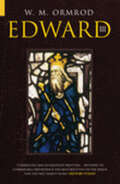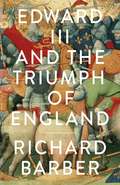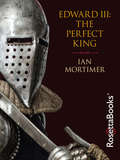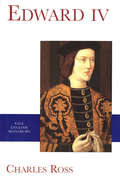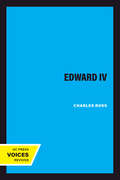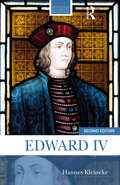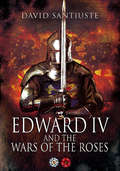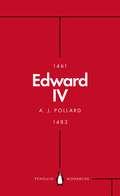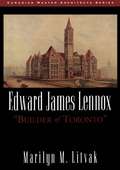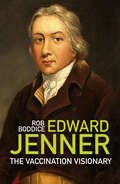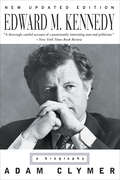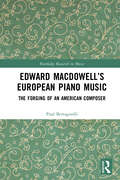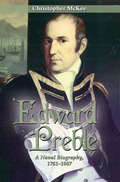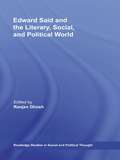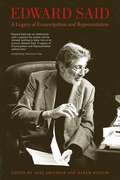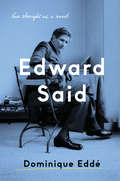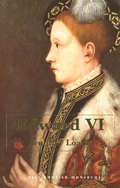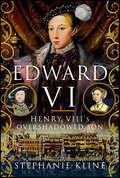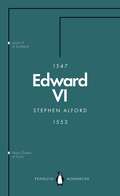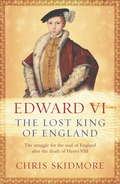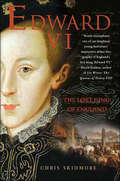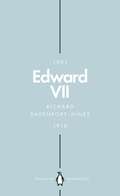- Table View
- List View
Edward III
by W M OrmrodThe fifty-year reign of one of England's most charismatic leaders is assessed in this lucid and incisive work. W.M. Ormrod traces Edward's life from his birth, when the very future of the monarchy in England was under threat, to his death when he was regarded throughout Europe as the very model of an ideal monarch.
Edward III and the Triumph of England: The Battle of Crécy and the Company of the Garter
by Richard BarberA fascinating recreation of the world of one of England's most charismatic monarchs, from award-winning author and historian Richard BarberThe destruction of the French army at Crécy in 1346 and the subsequent siege and capture of Calais marked a new era in European history. The most powerful, glamorous and respected of all western monarchies had been completely humiliated by England, a country long viewed either as a chaotic backwater or a mere French satellite.The young Edward III's triumph would launch both countries, as we now know, into a grim cycle of some 90 years of further fighting ending with English defeat, but after Crécy anything seemed possible - Edward's claim to be King of France could be pressed home and, in any event, enormous rewards of land, treasure and prestige were available both to the king and to the close companions who had made the victory possible. It was to enshrine this moment that Edward created one of the most famous of all knightly orders, the Company of the Garter.Barber writes about both the great campaigns and the individuals who formed the original membership of the Company - and through their biographies makes the period tangible and fascinating. This is a book about knighthood, battle tactics and grand strategy, but it is also about fashion, literature and the privates lives of everyone from queens to freebooters. Barber's book is a remarkable achievement - but also an extremely enjoyable one.Reviews:'Barber [has an] infectious passion for and deep knowledge of his subject matter ... elegant prose and rigorous historical analysis ... a valuable and thorough addition to the body of work on this most impressive of English monarchs' Sunday Times'In Edward III and the Triumph of England [Barber] has written the kind of book that the king would have enjoyed: full of battles, glitter and ceremony ... he has an original eye and an elegant pen' Jonathan Sumption, Literary Review'Barber share's his hero's love of chivalry ... The book sparkle[s] with some of Edward's own glitz' Telegraph'This absorbing book is layered rather than linear, sifting with uncommon sensitivity through challenging sources to test the boundaries of what we can and cannot know ... We discover the complexity of the world in which Edward and his commanders lived' Helen Castor, The TimesAbout the author:Richard Barber has had a huge influence on the study of medieval history and literature, both as a writer and as a publisher. His major works include The Knight and Chivalry (winner of the Somerset Maugham Award), Edward Prince of Wales and Aquitaine, The Penguin Guide to Medieval Europe and The Holy Grail: The History of a Legend. He lives in East Anglia.
Edward III: A Heroic Failure (Penguin Monarchs)
by Jonathan SumptionEdward III lived through bloody and turbulent times. His father was deposed by his mother and her lover when he was still a teenager; a third of England's population was killed by the Black Death midway through his reign; and the intractable Hundred Years War with France began under his leadership. Yet Edward managed to rule England for fifty years, and was viewed as a paragon of kingship in the eyes of both his contemporaries and later generations. Venerated as the victor of Sluys and Crécy and the founder of the Order of the Garter, he was regarded with awe even by his enemies. But he lived too long, and was ultimately condemned to see thirty years of conquests reversed in less than five. In this gripping new account of Edward III's rise and fall, Jonathan Sumption introduces us to a fêted king who ended his life a heroic failure.
Edward III: The Perfect King
by Ian MortimerA look at the brutal, brilliant fourteenth-century ruler, by the bestselling author of The Time Traveler&’s Guide to Medieval England. Holding power for over fifty years starting in 1327, Edward III was one of England&’s most influential kings—and one who shaped the course of English history. Revered as one of the country&’s most illustrious leaders for centuries, he was also a usurper and a warmonger who ordered his uncle beheaded. A brutal man, to be sure, but a brilliant one. Noted historian Ian Mortimer offers the first comprehensive look at the life of Edward III. The Perfect King was often the instigator of his own drama, but he also overthrew tyrannous guardians as a teenager and ushered in a period of chivalric ideals. Mortimer traces how Edward&’s reforms made feudal England a thriving, sophisticated country and one of Europe&’s major military powers. Ideal for anyone fascinated by medieval history, this lively book provides new insight into Edward III&’s lasting influence on the justice system, artistic traditions, language, and architecture of the country. &“The most remarkable medieval historian of our time.&” —The Times (London)
Edward IV
by Charles RossIn his own time Edward IV was seen as an able and successful king who rescued England from the miseries of civil war and provided the country with firm, judicious, and popular government. The prejudices of later historians diminished this high reputation, until recent research confirmed Edward as a ruler of substantial achievement, whose methods and policies formed the foundation of early Tudor government. This classic study by Charles Ross places the reign firmly in the context of late medieval power politics, analyzing the methods by which a usurper sought to retain his throne and reassert the power of a monarchy seriously weakened by the feeble rule of Henry VI. Edward's relations with the politically active classes—the merchants, gentry, and nobility—form a major theme, and against this background Ross provides an evaluation of the many innovations in government on which the king's achievement rests.
Edward IV
by Charles RossThis title is part of UC Press's Voices Revived program, which commemorates University of California Press’s mission to seek out and cultivate the brightest minds and give them voice, reach, and impact. Drawing on a backlist dating to 1893, Voices Revived makes high-quality, peer-reviewed scholarship accessible once again using print-on-demand technology. This title was originally published in 1974.
Edward IV (Routledge Historical Biographies)
by Hannes KleinekeDrawing together both recent research and original sources, this concise and accessible biography reassesses the debates surrounding the life of King Edward IV.The reign of King Edward IV occupies a pivotal place in late medieval English history, marking the transition from a medieval to a renaissance monarchy, yet there has been much controversy over the King's character. Was Edward a vain and self-indulgent playboy, or was his life cut tragically short? Offering readers insight into the latest scholarship, this second edition has been updated and revised to include a wider consideration of the role of women at Edward’s court, including his mother Cecily of York, as well as Edward’s own attitude to women and family. Kleineke also includes an extended discussion of Edward’s legacy, the government of England in the 1470s, and the cultural history of the period.As fascinating a character now as he was for Shakespeare over four centuries ago, Edward IV remains essential reading for all students of late medieval England, the Wars of the Roses, and all those interested in the history of monarchy more broadly.
Edward IV and the Wars of the Roses
by David SantiusteThis fascinating account of an unsung English monarch and military leader is &“a pleasing and well-informed appraisal of the first Yorkist king&” (Dr. Michael Jones, author of Bosworth 1485: Psychology of a Battle). Indisputably the most effective general of the Wars of the Roses in fifteenth-century England, King Edward IV died in his bed, undefeated in battle. Yet he has never been accorded the martial reputation of other English warrior kings such as Henry V. It has been suggested that perhaps he lacked the personal discipline expected of a truly great army commander. But, as the author shows in this perceptive and highly readable new study, Edward was a formidable military leader whose strengths and subtleties have never been fully recognized—perhaps because he fought most of his battles against his own people in a civil war. This reassessment of Edward&’s military skill—and of the Wars of the Roses in which he played such a vital part—provides fascinating insight into Edward the man as well as the politician and battlefield commander. Based on contemporary sources and the latest scholarly research, Edward IV and the Wars of the Roses stands as &“a valuable and thought-provoking addition to the canon, which ought to become required reading for anyone interested in the reign of the first Yorkist monarch&” (The Ricardian).
Edward IV: The Summer King (Penguin Monarchs)
by A J PollardIn 1461 Edward earl of March, an able, handsome, and charming eighteen-year old, usurped the English throne from his feeble Lancastrian predecessor Henry VI. Ten years on, following outbreaks of civil conflict that culminated in him losing, then regaining the crown, he had finally secured his kingdom. The years that followed witnessed a period of rule that has been described as a golden age: a time of peace and economic and industrial expansion, which saw the establishment of a style of monarchy that the Tudors would later develop. Yet, argues A. J. Pollard, Edward, who was drawn to a life of sexual and epicurean excess, was a man of limited vision, his reign remaining to the very end the narrow rule of a victorious faction in civil war. Ultimately, his failure was dynastic: barely two months after his death in April 1483, the throne was usurped by Edward's youngest brother, Richard III.
Edward James Lennox: "Builder of Toronto"
by Marilyn M. LitvakFrom 1876 to 1915, Edward James Lennox was a formidable force in Toronto’s architectural community. Many of his buildings are still landmarks in a city that continues to evolve.Born and educated in Toronto, Lennox looked to the past for inspiration but was never captured by it. His prototypical Annex houes on Madison Avenue, Old City Hall, and Casa Loma bear witness to his technical expertise and aesthetic sensibilities. Through text and illustrations, this volume tells the story of the a resolute architect whose vision helped shape an emerging city, and who in his time was called the "builder of Toronto."Edward James Lennox, "Builder of Toronto" is the first volume in the Canadian Master Architect series. Each publication will profile the work of an individual Canadian architect. The series editor is Marilyn M. Litvak.
Edward Jenner: The Vaccination Visionary (Pocket GIANTS)
by Rob BoddiceEdward Jenner is a giant of modern medicine. Throughout history, smallpox had plagued humanity with disfigurement, blindness and death. It was an incurable blight, the suffering of which Jenner helped to end.Surmising from the immunity of milkmaids that cowpox might be some defence against the ravages of smallpox, in 1793 he took some of the matter from a human case of cowpox and inserted it into the arm of a young boy. To test this, the first human-to-human vaccination, he subsequently inoculated the boy with smallpox itself, and found him to be immune from the disease. In 1979 smallpox was declared extinct.In this concise biography, Rob Boddice tells the story of Jenner’s life, his medical vision and his profound legacy. It is a story that encompasses revolutions in medical experimentation, public health provision and the prevention of other diseases, from anthrax to measles, but above all it highlights the profound impact that Jenner’s vision has had upon humanity’s battle against disease.
Edward Longshanks (Plantagenet Saga #7)
by Jean PlaidyHenry III had died and his son Edward, called Longshanks on account of his long legs and fine physique, was on his way home from the Holy Land with his wife, Eleanor, who had saved his life--some said--when she had sucked poison from a wound he had received from a would-be assassin. Edward was the strong man the country needed and he was dedicated to its service. His weakness was his love for his children and in particular his daughters with whom he could not bear to part even in marriage. There was the eldest and his favourite, the Princess Eleanor, who, marrying late enjoyed but brief happiness before tragedy overtook her; wild Joanna, born in Acre, defied her father when she married secretly; Margaret was married to a libertine and forced to receive his bastards; Mary was destined by her forceful grandmother for a convent; and Elizabeth married first for state reasons and the second time insisted on choosing for herself. Edward was the devoted family man, with his docile wife whom he loved so much that on her death he caused crosses to be set up where her coffin came to rest on its journey from Lincoln to London. His second marriage with the sister of the King of France was equally felicitous. It was his son who caused him great anxiety, for young Edward had surrounded himself with companions of questionable morals, chief of them, Piers Gaveston, who had begun to dominate the young Prince. These were stirring times and Edward's ambition was to unite the kingdoms of England, Scotland and Wales under his rule. Llewellyn of Wales loved the Demoiselle, daughter of Simon de Montfort, but their love story ended in tragedy and the submission of Wales. In Scotland the great hero, William Wallace, had appeared, and Wallace's adventures had made him a legend, but his need of women was to result in his fearful end at the hands of Edward. Edward Longshanks dominated his age. He was the great ruler, strong, just, cruel when he considered it necessary, vunerable only where his family was concerned. He emerges as one of the greatest kings England has ever known. His tragedy was that he died knowing that his work was incomplete and that the crown must pass to his dissolute son.
Edward M. Kennedy: A Biography
by Adam ClymerEdward M. Kennedy is one of the most influential senators in Congress. For the last 35 years, he′s played a major role in events ranging from the Vietnam War to Supreme Court confirmations. He′s also been closely associated with issues such as health care, civil rights and campaign finance reform. More than the foremost lawmaker and best orator in the Senate, he′s enthralled (and disappointed) a generation who saw him as the keeper of his famous brothers′ flame. He′s seen America -- and her politics -- change in drastic ways. In this definitive biography, New York Times Washington Editor Adam Clymer draws an in-depth portrait of this complex man. Through interviews with Kennedy, and the people close to him, he places Kennedy′s career in a historical perspective, and observes how Kennedy′s personal life has affected his political performance. The Senator has dealt with his infamous legacy, struggled to overcome the Chappaquiddick incident, and handled spectacular failures as well as many truimphs. He′s one of the few old-fashioned liberals who has held the Democratic Party to its principles, and is a hero to many. This is a unique, enormously readable chronicle of one of the most fascinating political figures of our time.
Edward MacDowell’s European Piano Music: The Forging of an American Composer (Routledge Research in Music)
by Paul BertagnolliEdward MacDowell’s European Piano Music is a critical study of the piano music that MacDowell composed during his European sojourn (1876–1888), steeped in reception history and with a special emphasis of programmaticism.The book expands current knowledge of MacDowell’s childhood in four of the chapters based on his previously uninvestigated sheet music collection, thereby achieving a better balance among the stages of MacDowell’s life than is evident in most books of the life-and-works variety. Prolific contemporaneous music criticism, meticulously preserved in MacDowell’s scrapbooks, is likewise undervalued in the MacDowell literature, but it furnishes penetrating observations about the expressive and programmatic content of numerous compositions, especially as it was revealed to critics when MacDowell performed his own works. Lastly, the book offers explanations for why MacDowell immersed himself in European culture for decades and then, at a crucial juncture in his career, embraced diverse American heritages and worked toward a conception of a pluralistic music that was American “in a creative sense.”The book’s content and methodology would appeal most directly to specialists within the broad fields of musicology and music theory, particularly within American art music and its composers; nineteenth-century music; program music; reception history; and piano literature.
Edward Preble
by Christopher MckeeOriginally published in 1972, Christopher McKee's biography of Edward Preble remains the most authoritative source on this influential early shaper of the U.S. naval tradition. McKee (Grinnell College) documents Preble's rise from obscurity to become Thomas Jefferson's chief administrator, his relationship with Jefferson and the president' policies and strategies during the war, and also the Tripolitan activities and attitudes which confronted Preble as he sought to bring the war to an end. This Classic of Naval Literature work includes illustrations and a new introduction by the author.
Edward Said On The Prospects Of Peace In Palestine And Israel
by John Randolph LeblancJohn Randolph LeBlanc examines the political oeuvre of critic and activist Edward Said and finds that Said preferred "reconciliation" to segregation in Palestine/Israel. LeBlanc argues that Said's criticism speaks to the importance of negotiating the troubling, proximate, and unsettling presence of our most perplexing others.
Edward Said and the Literary, Social, and Political World (Routledge Studies in Social and Political Thought)
by Ranjan GhoshEdward Said is widely recognized for his work as a critic and theorist of Orientalism and the Palestine crisis, but far less attention has been devoted to his considerable body of literary and cultural criticism. In this edited collection, the contributors - many among the foremost Said scholars in the world - examine Said as the literary critic; his relationship to other major contemporary thinkers (including Derrida, Ricoeur, Barthes and Bloom); and his involvement with major movements and concerns of his time (such as music, Feminism, New Humanism, and Marxism). Featuring freshly carved out essays on new areas of intervention, the volume is an indispensable addition for those interested in Edward Said and the many areas in which his legacy looms.
Edward Said: A Legacy of Emancipation and Representation
by Adel Iskandar and Hakem RustomEdward W. Said (1935–2003) ranks as one of the most preeminent public intellectuals of our time. Through his literary criticism, his advocacy for the Palestinian cause, and his groundbreaking book Orientalism, Said elegantly enriched public discourse by unsettling the status quo. This indispensable volume, the most comprehensive and wide-ranging resource on Edward Said’s life and work, spans his broad legacy both within and beyond the academy. The book brings together contributions from thirty-one luminaries—leading scholars, critics, writers, and activists—to engage Said’s provocative ideas. Their essays and interviews explore the key themes of emancipation and representation through the prisms of postcolonial theory, literature, music, philosophy, and cultural studies.Contributors: Bill Ashcroft, Ben Conisbee Baer, Daniel Barenboim, Timothy Brennan, Noam Chomsky, Denise DeCaires-Narain, Nicholas Dirks, Marc H. Ellis, Rokus de Groot, Sabry Hafez, Abdirahman A. Hussein, Ardi Imseis, Adel Iskandar, Ghada Karmi, Katherine Callen King, Joseph Massad, W. J. T. Mitchell, Laura Nader, Ilan Pappe, Benita Parry, Rajagopalan Radhakrishnan, Jahan Ramazani, Jacqueline Rose, Lecia Rosenthal, Hakem Rustom, Avi Shlaim, Ella Habiba Shohat, Robert Spencer, Gayatri Chakravorty Spivak, Anastasia Valassopoulos, Asha Varadharajan, Michael Wood
Edward Said: His Thought as a Novel
by Dominique EddeAn intimate account of Edward Saïd's life and thoughtEdward Said is a personal, literary portrait of one of the twentieth century’s most influential scholars, written by his close friend and confidante. Here, Lebanese novelist and essayist Dominique Eddé offers a fascinating and fresh presentation of his oeuvre from his earliest writings on Joseph Conrad to his most famous texts, Orientalism and Culture and Imperialism. Eddé weaves together accounts of the genesis and content of Said’s work, his intellectual development, and her own reflections and personal recollections of their friendship, which began in 1979 and lasted until Said’s death in 2003. In this intimate and searching portrait of Said’s thought, Eddé continues to maintain their dialogue despite his death, trying to make peace with the loss of a collaborator with whom she still wants to talk and disagree.Bringing together personal reflection and theoretical innovation, reflective mourning and immediate argument, Eddé has written a testament to a great intellectual passion.Both specialists of Said’s work and newcomers will find much to learn in this rich portrait of one of the twentieth century’s most important intellectuals.
Edward VI
by Jennifer LoachEdward VI was the son of Henry VIII and his second wife, Jane Seymour. He ruled for only six years (1547-1553) and died at the age of sixteen. But these were years of fundamental importance in the history of the English state, and in particular of the English church. This new biography reveals for the first time that, despite his youth, Edward had a significant personal impact. Jennifer Loach draws a fresh portrait of the boy king as a highly precocious, well educated, intellectually confident, and remarkably decisive youth, with clear views on the future of the English church. Loach also offers a new understanding of Edward's health, arguing that the cause of his death was a severe infection of the lungs rather than tuberculosis, the commonly accepted diagnosis. The author views Edward not as a sickly child but as a healthy and vigorous boy, devoted to hunting and tournaments like any young aristocrat of the day.This book tells the story of the monarch and of his time. It supplies the dramatic context in which the short reign of Edward VI was played out--the momentous religious changes, factional fights, and popular risings. And it offers vivid details on Edward's increasing absorption in politics, his consciousness of his role as supreme head of the English church, his determination to lay the foundation for a Protestant regime, and how his failure in this ambition brought England to the brink of civil war.
Edward VI: Henry VIII's Overshadowed Son
by Stephanie KlineFor too long, King Edward VI has been pushed to the very edges of Tudor history - overlooked in favor of some of the more vibrant personalities of his family members, such as Henry VIII and Elizabeth I. Known as the 'boy king' of the Tudor dynasty, he is often remembered for little more than the ambitious councillors who governed England during his minority. His reign, however, and the significant religious changes that took place as he furthered the Protestant Reformation in England, had great influence over the remaining decades of the Tudor period and even modern Britain as we know it today. ‘Boy king’ though he may have been, Edward VI and his government were more significant to the history of England than he is often given credit for, and it is long past time for careful and thoughtful study of his life and reign. Edward VI: Henry VIII’s Overshadowed Son aims to reopen the pages of his story, arguing that however brief it may have been, Edward VI’s reign had lasting impacts on the religious landscape in England, and is certainly a Tudor reign worth remembering.
Edward VI: The Last Boy King (Penguin Monarchs)
by Stephen AlfordEdward VI, the only son of Henry VIII, became king at the age of nine and died wholly unexpectedly at the age of fifteen. All around him loomed powerful men who hoped to use the child to further their own ends, but who were also playing a long game - assuming that Edward would long outlive them and become as commanding a figure as his father had been. Stephen Alford's wonderful book gives full play to the murky, sinister nature of Edward's reign, but is also a poignant account of a boy learning to rule, learning to enjoy his growing power and to come out of the shadows of the great aristocrats around him. England's last child monarch, Edward would have led his country in a quite different direction to the catastrophic one caused by his death.
Edward VI: The Lost King of England
by Chris SkidmoreThe struggle for the soul of England after the death of Henry VIIIIn the death of Henry VIII, the crown passed to his nine-year-old son, Edward. However, real power went to the Protector, Edward's uncle, the Duke of Somerset. The court had been a hotbed of intrigue since the last days of Henry VIII. Without an adult monarch, the stakes were even higher. The first challenger was the duke's own brother: he seduced Henry VIII's former queen, Katherine Parr; having married her, he pursued Princess Elizabeth and later was accused of trying to kidnap the boy king at gunpoint. He was beheaded. Somerset ultimately met the same fate, after a coup d'etat organized by the Duke of Warwick. Chris Skidmore reveals how the countrywide rebellions of 1549 were orchestrated by the plotters at court and were all connected to the (literally) burning issue of religion: Henry VIII had left England in religious limbo. Court intrigue, deceit and treason very nearly plunged the country into civil war. Edward was a precocious child, as his letters in French and Latin demonstrate. He kept a secret diary, written partly in Greek, which few of his courtiers could read. In 1551, at the age of 14, he took part in his first jousting tournament, an essential demonstration of physical prowess in a very physical age. Within a year it is his signature we find at the bottom of the Council minutes, yet in early 1553 he contracted a chest infection and later died, rumours circulating that he might have been poisoned. Mary, Edward's eldest sister, and devoted Catholic, was proclaimed Queen. This is more than just a story of bloodthirsty power struggles, but how the Church moved so far along Protestant lines that Mary would be unable to turn the clock back. It is also the story of a boy born to absolute power, whose own writings and letters offer a compelling picture of a life full of promise, but tragically cut short.
Edward VI: The Lost King of England
by Chris SkidmoreThe birth of Edward on October 12, 1537, ended his father's twenty-seven-year wait for an heir. Nine years later, Edward was on the throne, a boy-king in a court where manipulation, treachery, and plotting were rife.Henry VIII's death in January 1547 marked the end of a political giant whose reign had dominated his kingdom with an iron grip for thirty-eight years. Few could remember an England without him---certainly little had remained untouched: the monasteries and friaries had been ripped down, the Pope's authority discarded, and new authoritarian laws had been introduced that placed his subjects under constant fear of death.Edward came to the throne promising a new start; the harsh legislation of his father's was repealed and the country's social and economic problems approached with greater sensitivity. Yet the early hope and promise he offered soon turned sour. Despite the terms of Henry's will, real power had gone to just one man---the Protector, Edward's uncle, the Duke of Somerset, and there were violent struggles for power, headed by the duke's own brother, Thomas Seymour.Chris Skidmore reveals how the countrywide rebellions of 1549 were orchestrated by the plotters at court and were all connected to the burning issue of religion: Henry VIII had left England in a religious limbo. Court intrigue, deceit, and treason very nearly plunged the country into civil war. The stability that the Tudors had sought to achieve came close to being torn apart in the six years of Edward's reign.Even today, the two dominant figures of the Tudor period are held to be Henry VIII and Elizabeth I. Yet Edward's reign is equally important. His reign was one of dramatic change and tumult, yet many of the changes that were instigated during this period---certainly in terms of religious reformation---not only exceeded Henry's ambitions but have endured for over four centuries since Edward's death in 1553.
Edward VII: The Cosmopolitan King (Penguin Monarchs)
by Richard Davenport-HinesLike his mother Queen Victoria, Edward VII defined an era. Both reflected the personalties of their central figures: hers grand, imperial and pretty stiff; his no less grand, but much more relaxed and enjoyable. This book conveys Edward's distinct personality and significant influences. To the despair of his parents, he rebelled as a young man, conducting many affairs and living a life of pleasure. But as king he made a distinct contribution to European diplomacy and - which is little known - to London, laying out the Mall and Admiralty Arch. Richard Davenport-Hines's book is as enjoyable as its subject and the age he made.
